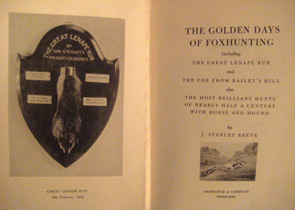Reviewed by Master Basil Bermondsey

The book includes a trophy for the reader.
Curse the days when inclement weather prevents the Forest Park Fox Hunt from running! Is there any event more consternating than awakening with fire in one’s blood for the hunt, only to find that a snowfall or tornado lays across the land and precludes the hounds and horses from running?
Yesterday was one such day. I had resigned myself to scratching my foxhunt itch by training in my wine cellar. But just as my manservant wound the clockwork fox and I inflated my blow-up hounds, a courier arrived bearing a message from my good friend Reverend Albert Ratcliff. This courier had brought a book, along with a note: “My good Basil; today’s hunt is cancelled, but perhaps you’ll find some succor in the work of the late Mr. Stanley Reeve.”
He did not lead me astray! In his The Golden Days of Foxhunting, Mr. Reeve (of Philadelphia’s storied Radnor Hunt) collected a series of hunt stories that would rivet any hunter. Beginning by relating the tale of the “Penn Tavern” hunt of 23rd November, 1912, Reeve puts the crop to the reader hard and never lets up.
Some highlights include “The Fence Breakers League,” in which Reeve has a laugh at local farmers’ complaints that foxhunters regularly destroy their fences. Members of the Forest Park Fox Hunt will recall that we have had this problem ourselves with landowners when our hunt has strayed into “Dogtown,” the residents of which (despite their borough’s name) do not appreciate our noble sport. As amusing as the antics of the farmers are, however, this tale does not hold a candle to Reeve’s most amusing chapter, titled simply – and hilariously – “Mud!”. In this chapter, Reeve reveals that his hunt of 1st March, 1913 entailed muddy conditions, and that he, his horse, and the hounds all got mud on them. Stop, sir! I die!
But Reeve’s excellent book is not only entertaining accounts of hunts; the author also shares some deeper insights about foxhunting, and life more generally. In an impressive display of erudition, he quotes an ancient Arab proverb: “True happiness is only to be found in two places—on the back of a horse and in the arms of the woman you love,” and comments,
“Whether this happiness is divided equally between the horse and the lady is rather a delicate matter, so to save the feelings of the latter, perhaps we had better not discuss it.”
Indeed! Truer words were never spoken, and Dr. Meriweather Southwark has made this same point to me on several occasions as an explanation of his continued bachelorhood. For this and similar passages, I recommend Mr. Reeve’s book most heartily and unreservedly to my fellow huntsmen and women.